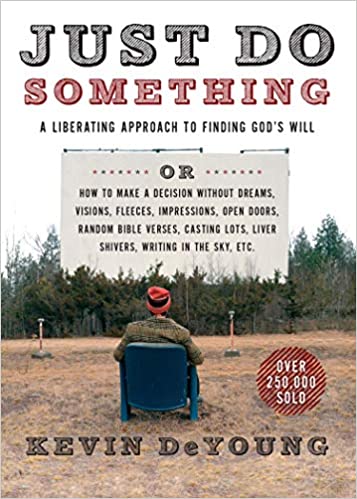A Brief Book Notice from Books At a Glance
By Fred G. Zaspel
“Finding God’s will for my life” is a notion that in recent generations of evangelicalism has been surrounded mystical ideas of various kinds, mostly unhelpful. In the common notion, God – more or less like a cosmic Easter Bunny – hides his will from his people, as in a bush, and leaves it to them to find it. The search is attended sometimes by tortuous prayer and soul-searching, waiting for confirmation that “this is it.”
 I don’t mean to sound pejorative, and I don’t think any who have been acquainted with the idea will think my characterization is unfair. Even in circles that otherwise would insist on the sufficiency of Scripture and deny the idea of special revelation from God or other such individual communications, this notion often prevails – God has an individual will for each of us that affects virtually every decision we make: whom to marry, what car to buy, what job to take, whether to write this or that letter, and on and on it goes.
I don’t mean to sound pejorative, and I don’t think any who have been acquainted with the idea will think my characterization is unfair. Even in circles that otherwise would insist on the sufficiency of Scripture and deny the idea of special revelation from God or other such individual communications, this notion often prevails – God has an individual will for each of us that affects virtually every decision we make: whom to marry, what car to buy, what job to take, whether to write this or that letter, and on and on it goes.
The upshot of this understanding all too often is a heavy dose of frustration, uncertainty, and subjectivism. Just how can you know when this is it? And why did God so secretly hide his will from us anyway? Wouldn’t he want to make it more obvious?
Or maybe we had been asking the wrong questions.
In 1979 Garry Friesen published his famous Decision Making and the Will of God: A Biblical Alternative to the Traditional View (paperback or kindle), a book that made quite a splash at the time. Friesen challenged the prevailing notion outright and set out to explore a more concrete, objective, and biblical approach. Even if he did overstate his case at certain points, many found it to be a very refreshing, even liberating alternative.
In 1982 Sinclair Ferguson published a helpful little book, Discovering God’s Will (paperback), that encourages us to approach the question with a firmer confidence in the sufficiency of Scripture and divine providence. We are not to “discover” God’s will by crying out at crisis moments but as we walk with God as he has directed.
In his 2002 Finding the Will of God: A Pagan Notion? (paperback or kindle), Bruce Waltke challenges the notion of seeking such guidance on specific or individual questions, explores the similarities to pagan rituals, and charts out a path to “live in God’s will” as he has directed us in Scripture.
Then in 2009 Kevin DeYoung published his very helpful, Just Do Something: A Liberating Approach to Finding God’s Will (paperback or kindle), His fuller title tells us up front what he wants to accomplish and correct: Just Do Something: A Liberating Approach to Finding God’s Will: or, How to Make a Decision Without Dreams, Visions, Fleeces, Open Doors, Random Bible Verses, Casting Lots, Liver Shivers, Writing in the Sky, etc. He sums up his argument rather crisply: “So the end of the matter is this: Live for God. Obey the Scriptures. Think of others before yourself. Be holy. Love Jesus. And as you do these things, do whatever else you like, with whomever you like, wherever you like, and you’ll be walking in the will of God” (p. 122). This book has an accompanying study guide.
 The traditional notion has left too much frustration, and its subjectiveness has allowed too many to blame God for their decisions. I think you’ll find these books will help you toward a better, more satisfying understanding of the question. Enjoy!
The traditional notion has left too much frustration, and its subjectiveness has allowed too many to blame God for their decisions. I think you’ll find these books will help you toward a better, more satisfying understanding of the question. Enjoy!
